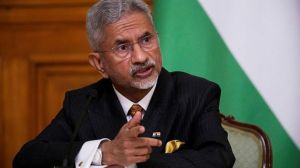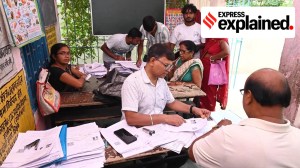Hoping for mile from Pakistan,India gives more than an inch
Joint statement,after both PMs meet,says action on terrorism should not be linked to dialogue process; Singh clarifies: need to see action on 26/11 if talks have to succeed....
Prime Minister Manmohan Singh and his Pakistan counterpart Yousuf Raza Gilani today stopped short of resuming the stalled Composite Dialogue process with New Delhi opting to wait for a couple of months to watch how Islamabad translates its assurances on the 26/11 investigations into concrete action.
This became clear only after enough confusion had been created by one line in the joint statement issued hours after the two leaders met: Action on terrorism should not be linked to the composite dialogue process and these should not be bracketed.
This was seen as India agreeing to resume the dialogue process. Later,when the PM was asked about this,his reply was categorical,That is not my interpretation.
And then he explained: The Pakistani side was very keen we agree here and now to resume the composite dialogue. But unless we are satisfied about the action taken against the people responsible for the Mumbai attacks no dialogue can succeed.
Dismissing the view that India had effectively opened the doors for the dialogue to start without any concrete result on the terror front,he said: We were quite clear that if acts of terrorism continue to be perpetrated,there is no question of a dialogue,least of all,a comprehensive dialogue. If there is no attempt to contain terrorism,no dialogue can make progress. A dialogue process even if it starts,cannot move forward.
The first test will come up on Saturday when the case against Lashkar-e-Toiba operations head and prime accused Zaki-ur-Rehman Lakhvi comes up for hearing. The expectation is that he,along with five others,will be indicted and a chargesheet submitted. But India continues to be watchful as the case has been adjourned thrice because a new judge has not been appointed to the court concerned.
At the same time,India is somewhat encouraged by the 36-page dossier on the Mumbai investigations that Pakistan handed over last week. Reason: the document concedes that the LeT was responsible for the attack,it admits to the fact that the attack was planned in Pakistan and also names Lakhvi and carries the assurance that Islamabad will move soon to indict the accused.
Todays joint statement states that the Foreign Secretaries should meet as often as necessary and report to the two Foreign Ministers who will be meeting on the sidelines of the forthcoming UN General Assembly. This way,sources said,India will wait and see what happens until September when the Foreign Minister travels for the UNGA to New York.
Indian officials too tried to convey there had been no climbdown on New Delhis part but did not sound convincing. Asked if the ice between India and Pakistan had melted,Singh replied: This,time will only tell. We have begun a process. How successful we are in achieving our objective only time will tell. I cannot predict the outcome of the Foreign Secretary talks…our relations have been subject to too many accidents. I really cant say I have a roadmap where there will be no accidents.
The statement came at the end of nearly three hours of talks between Singh and Gilani. The two leaders first met without aides for about 45 minutes and were later joined by their delegations at the resort where Singh is staying.
The joint statement also said that both leaders agreed that the two countries will share real time,credible and actionable information on any future terrorist threats. The move had some resemblance to the joint terror mechanism that the neighbours had put in place after the July 2006 Mumbai train blasts,incidentally on the sidelines of the previous NAM summit in Havana.
While that mechanism remained mostly on paper,officials hoped that this time Islamabad would remain committed. While Singh reiterated the need to bring the perpetrators of the Mumbai attacks to justice,Gilani responded by assuring him that Pakistan will do everything in its power in this regard.
While there was no mention of Jammu and Kashmir in the joint statement unlike in previous such documents it said that,Prime Minister Gilani mentioned that Pakistan has some information on threats in Balochistan and other areas,a hark back to Islamabads accusations that New Delhi was fomenting trouble in that revolt-torn province of Pakistan. Indian diplomats however sought to dismiss it as a lame introduction.
Asked how Balochistan made its way into the joint statement,Singh said Gilani told him there was a feeling in Pakistan that India was responsible for the unrest there. I told him our conduct is an open book and we are willing to discuss it. If you have evidence,we will look into it. We are not afraid of discussing anything.
Photos
- 01
- 02
- 03
- 04
- 05






























